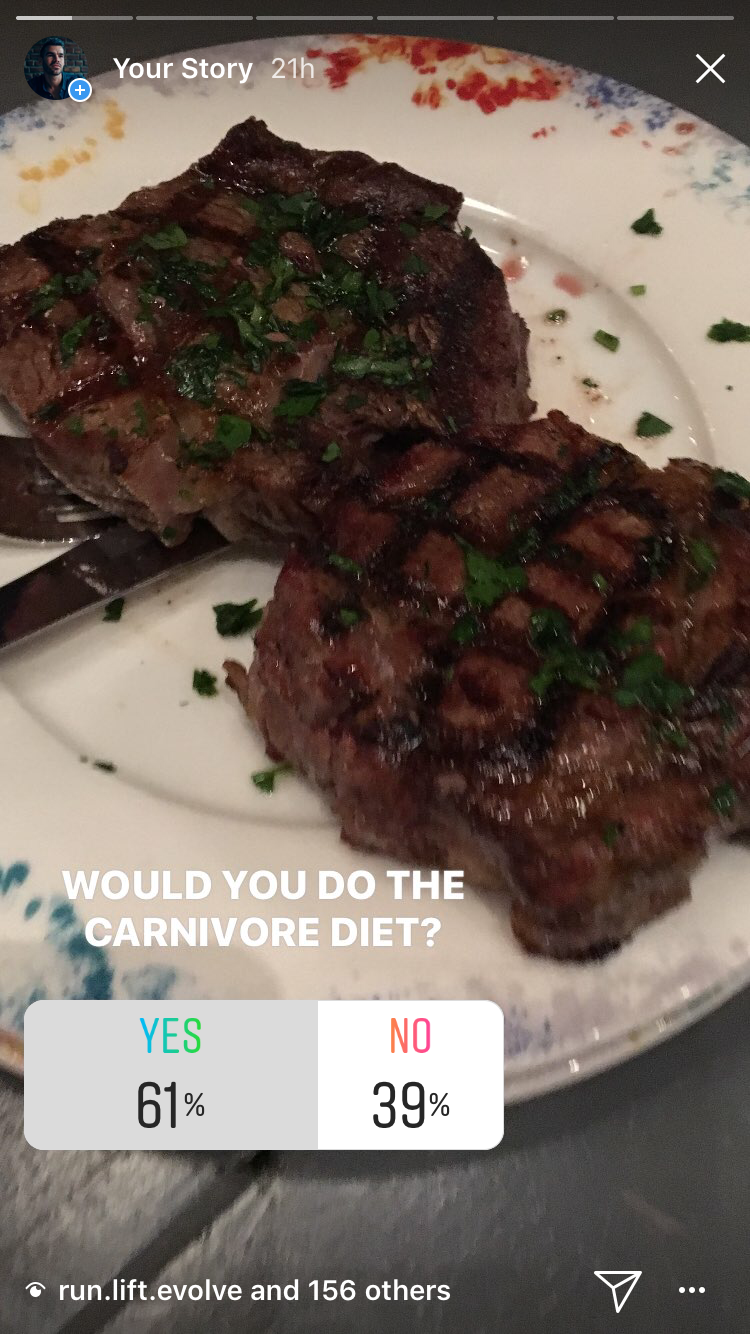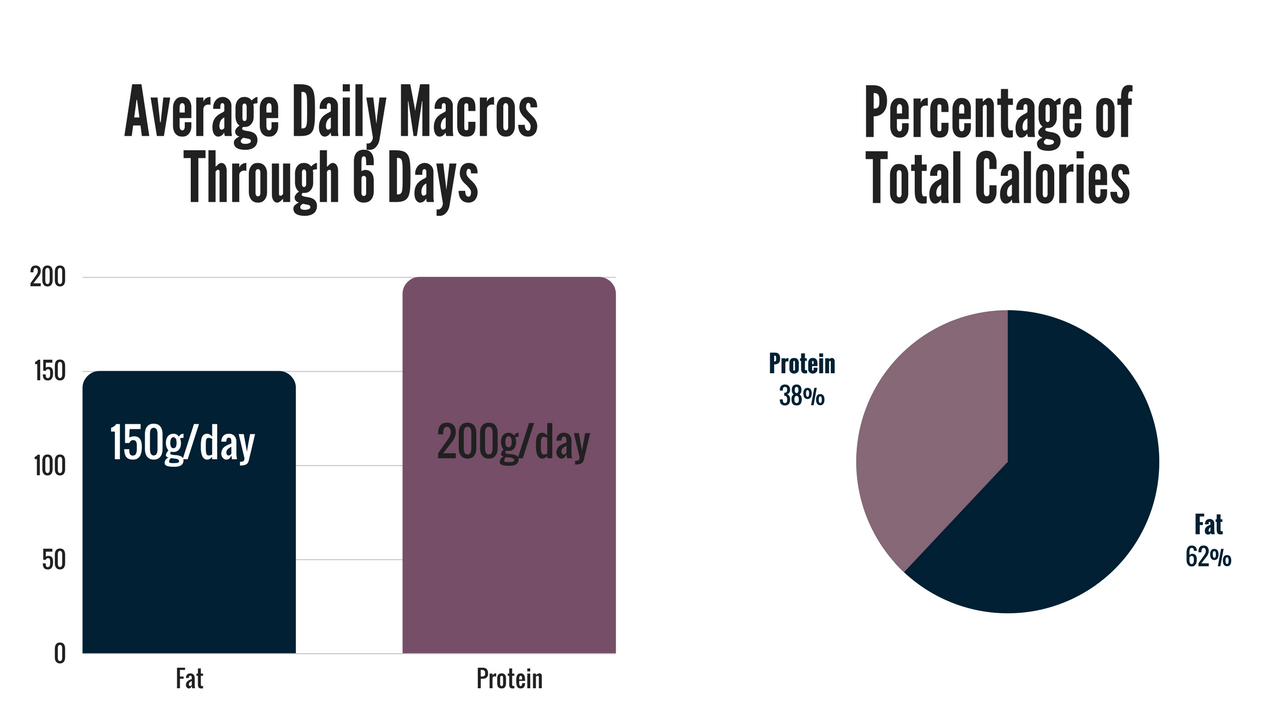Recently, I told you about my 30-day experiment with the Carnivore Diet. This is the Carnivore Diet FAQ.
I also announced it on my Instagram Story and it got more responses than any other story or post I made. Ever. (Follow me on Instagram for real-time updates on my Carnivore journey.)
I asked story viewers to share with me their concerns and/or questions over this Carnivore Diet experiment. The questions were phenomenal and I wanted to archive my answers… enter this FAQ blog post.
I also asked if readers would try this diet themselves. The results after a 24-hour poll on my Instagram Story:

Carnivore Diet FAQ
Q = Are you supplementing with any micronutrients?
A = No. I want to know how micronutrients are affected by the diet itself, so I will not supplement with anything during the 30-day experiment as that would taint the validity of the experiment.
By not supplementing with anything we’ll know what potential gaps exist & could/should be addressed for those who choose to follow this approach long term.
Q = Are you supplementing with psylium husk?
A = No. Same reason as above.
Q = What markers will you test for inflammation?
A = I’ll be doing a full blood workup – lipids, C-Reactive Protein, micronutrient levels along with urinalysis and a stool test to determine the health of my microbiome.
Q = Are you eating any organ meats?
A = Yes. Organ meats are part of my regular diet, but I will place an extra emphasis on them during this 30-day experiment as they as revered for their high nutrient density – something that I see as insurance/extra protection against potential deficiencies.
My go-to is the Liverwurst from US Wellness Meats. It contains heart (15%), kidneys (15%), and liver (20%), along with beef trim (50%).
Q = Are you eating fish?
A = Yes, but they’ll be fattier fish like salmon or sardines. I’m trying to match the protein:fat ratio of a ribeye and most fish are leaner than this. If I do have leaner fish, I’ll add lard, tallow, marrow or bone broth to boost the fat content. And of course, the fish will be wild caught.
Q = Are you worried about the effects of an all-protein diet?
A = This is NOT a protein only diet. See the macronutrient breakdown below (also on my original Carnivore Diet blog post). It is extremely low carb, but more than 50% of the macronutrients are fat.
It is not ketogenic. The fat is about 60-62% of calories based on the macro count for 2 ribeyes per day. I won’t count, measure or bother myself with this minutia.

Q = What about your kidneys and all that protein?
A = What about them?
This is “one of the most perpetuated myths” in nutrition and precisely the type of misinformation that needs to be removed from people’s brains.
Check out this Eat To Perform podcast at 34:05 for a better explanation than I can type here.
Q = Are you worried about the link between red meat and cancer?
A = No. Not in thirty days.
Besides, the study that spawned click-bait headlines about red meat and cancer classified processed meats as carcinogens (cancer-causing substances) – not grass-fed, natural, organic meats.
As always, the details of a study matter – as does the quality of the food we eat.
That said, I would like to see the data on some of the predictive biomarkers for Carnivores eating grass-fed meats versus Carnivores eating factory farmed meats compared.
This is another reason I’m non-wavering on my personal value of eating only the highest quality meat.
Q = What about bone broth?
A = Yes, I’ll be consuming bone broth several times a week. I’ll use this as a higher fat supplement on the days I eat leaner cuts of meat (venison, turkey, etc) and because it is full of glutamine, glycine, and proline, known to promote gut health.
It also contains minerals, collagen protein and other joint friendly micronutrients like glucosamine, chondrotin and hyaluronic acid.
Q = What is your daily routine for meal/food consumption? Any other protocols included (fasting, etc)?
A = Yes, I’ve always gravitated towards daily IF. I’ll eat when I’m hungry, so my exact window may slide earlier or later, depending on the day, but typically I’m aiming for 2 meals between 11am and 4pm.
My lifts will take place between those meals, somewhere around 1-2pm, 3-4 days per week.
Q = Did you cook with spices or marinades?
A = Yes to the spices. I used sage, rosemary (reduces carcinogens in cooked meat), turmeric and black pepper. No on the marinades. I’ve never been one to use them, so honestly, this never crossed my mind.
Q = But, how did you FEEL?
A = I felt great. From Day 1, I had a bounce in my step that had been missing when I was eating keto.
Q = How did the cost of this diet compare to your normal grocery bill?
A = The same or cheaper. No matter how I eat, food quality is always a priority for me. When I ate keto, I ate organic nuts, nut butters, avocados and 100% chocolate. High quality fats are not cheap. While the argument against grass fed or wild caught protein is that it is more expensive than the grain-fed counterparts, realize that your shopping list now excludes fats and veggies (fermented veggies are also on the expensive side).
I also took steps to save money on my meats – organ meats and bones for marrow and broth (even from grass-fed animals) are extremely cheap. They’re also loaded with micronutrients and health promoting nutrients. I also ate an entire deer that I harvested myself with a bow. I paid a little over $1 per pound after processing.